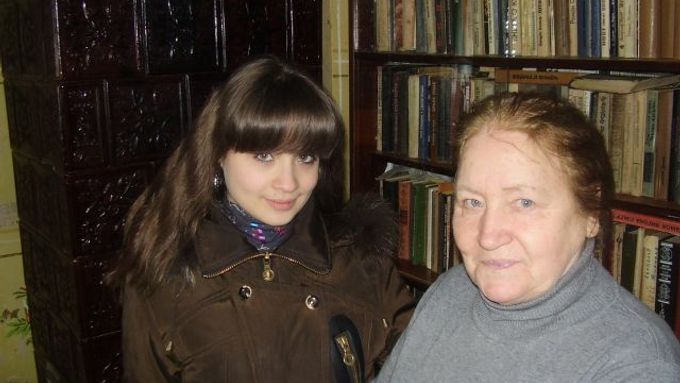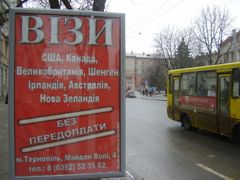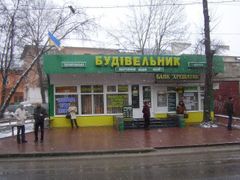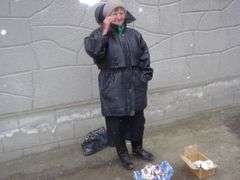Ternopol - Behind a frozen snowy lake rises the silhouette of the two towers of a Roman Catholic church and two smoking chimneys.
All around stand rows of pre-fab high rises from the Soviet era. Some repaired, some falling apart.
The city of Ternopol, which lies close to the Polish border in an area once known as Halič is the most desolate and depopulated in Ukraine. Its residents have left to work abroad in greater proportion than in any other area in the country.
Of the 52 million Ukrainians, more than 6 million work in Europe - from Russia to Portugal. The money they earn helps those who have stayed behind survive. This is especially true now at a time of economic crisis, which has hit Ukraine the hardest in all of Europe.
Help from Europe
Marie Vasilievna Mokryjová lives in a small house not far from the centre of Ternopol with her 18-year-old granddaughter Natalia.
Her pension amounts to 600 hryvnias. They both live mainly off the money sent to them by Natalia's mother, who works in the Czech Republic.
"If it wasn't for the money my daughter sends from the Czech Republic, I don't know how we would make ends meet. I miss her very much. But we wouldn't even be able to buy food or pay the rent and heating. And everything is getting more expensive now," says the 72-year-old woman, adding that almost every family in Ternopol has someone in Europe.
On one of the town's main streets glow billboards advertising an agency that offers visas to the United States, the EU, Canada and other countries. The agency certainly does not lack clients.
"There used to be big factory here that produced combine-harvesters. But it relied on parts imported from Russia, and after the fall of the Soviet Union, the imports stopped. So the factory went out of business. I was happy that Ukraine gained independence, but it had a negative side to it as well," says Marie Vasilijevna.
Generation raised by grandparents
In the last few years, she has been looking after her granddaughter, who will turn 18 in the summer. There is a generation of Ukrainians growing up that has been raised by grandparents because of the difficult economic situation because the parents went abroad to earn money.
"Who knows what will happen to Ukraine when all the young ones are leaving and setting up families elsewhere," says Marie's son Viktor, who worked in Greece for several years.
The current crisis is creating pressure in Europe to send foreign workers back to their home countries. This is something that Ukraine is afraid of because the recession has already had a big impact on its economy.
As of last autumn, on average one out of every 10 Ukrainians has lost his job because steel plants and chemical factories, the foundation of Ukraine's economy, have shut down or reduced production because of falling demand.
Czech versus Ukrainian problems
Seventeen out of 36 steel plants are struggling, so workers are not receiving any money or have been forced to stay away from work. Industrial production fell year on year in January by more than a third, and the Ukrainian currency lost half of its value against the dollar from mid autumn.
Those Ukrainians, who took out loans in the past few years in western currencies are now in very difficult situations as a result.
No other European state has been experiencing such difficult problems. Many Ukrainians would probably gladly trade their problems for those of the Czechs.
Some banks have also limited their clients' ability to withdraw money because the banks do not have enough cash. Some of the smaller banks are on the verge of bankruptcy.
"I don't expect it to get better any time soon. I probably won't live to see it, but maybe my granddaughter will," says Marie Vasilijevna, painting a bleak picture of the future.
Her big gas stove heats the small house very well, but even that has an uncertain future. No one knows whether the debt-ridden Ukraine will be able to fulfill its commitments and pay Russia for gas supplies.
For Ukrainians, though, the crisis is nothing unusual. Its modern history has seen bad times taking turns with even worse times.
"At the beginning of the 1990s there was a big crisis. There was almost no food. There were queues to buy bread. In the 20s and 30s there was also much hunger and misery. People in Ukraine simply count on something like that happening again," says 25-year-old Táňa, who is from Ternopol and works in Prague.
She would like to return to Ukraine and live there, but a tiny salary, of which she would spend more than half for rent and services would make it very difficult.
Despite the crisis Valentina, who is from a nearby village, is doing good business selling snowdrops by the Orthodox Church in Russian street in Ternopol.
"I don't know what I could tell you about the crisis. I come here from the village and people keep buying my snowdrops. Sometimes I even sell two boxes a week," she says smiling, as she puts three hryvnias into her pocket.
Adapted by Prague Daily Monitor.












